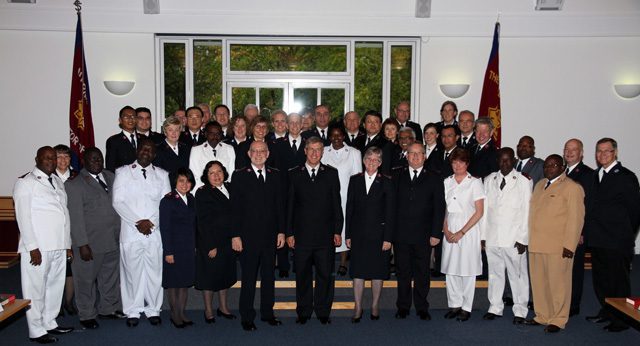from the desk of…
by Donald Hostetler, Major –
In the early 1970s, a book by Gail Sheehy created a stir. It was titled Passages—Predictable Crises of Adult Life. Sheehy identified those periods of human development that seem to be fraught with peril—adolescence, mid-life, retirement—and discussed means of coping with them. In fact, “mid-life crisis” has become a catch phrase in our modern vocabulary; it even has an entry in Wikipedia!
The success of Sheehy’s book spawned other approaches to the passages in life, including Passages of a Pastor: Coping with yourself and God’s people by Cecil R. Paul. The subject of transition continues to intrigue those with an interest in human development.
Twenty-one cadets have arrived at the College for Officer Training, bringing ten children with them. That arrival marks a set of passages that have enormous impact. Members of the “God’s Fellow Workers” session have left vocations as corrections officer, entrepreneur, foster parent, youth worker, business manager, and the like to obey God’s call to enter ministry as a Salvation Army officer. Children have left familiar surroundings and schools. Friends and family may now be hundreds of miles away. Consider the passages:
From civilian to cadet.
For most, this change first impacts in the matter of wardrobe. What to wear and how to wear it is no longer a matter of individual choice; a cadet wears uniform daily. This is but one aspect of operating under the disciplines of the college that will now characterize the life of the cadet.
From worker to learner.
Cadets are often overwhelmed by the tower of textbooks they receive upon arrival. They must adjust to a daily routine dominated by learning, whether in the classroom or in field assignments. Reading, listening, processing information and writing, impart knowledge needed as officers. The practice of ministry tasks on campus and in field assignments develops skills to fulfill their calling. Intentional spiritual formation and community living create attitudes useful for effective service.
From living in isolation to living in community.
Quarters are tight and close. One sees the same faces all day, day after day, including those next door and across the hall. Such close living can become occasions for abrasions, but by the grace of God Crestmont provides an opportunity to develop Spirit-led Christian community.
From individual to member.
For some cadets, the culture shock of sharing ministry with a spouse is a profound change from spending their workday apart from each other; they are forging a ministry team with husband or wife. The privilege of working in mission teams with other cadets also represents both opportunity and challenge. But a significant passage for those entering training that will bear lifelong meaning is that of becoming a member of a session. These cadets will always carry “God’s Fellow Workers” as part of their joint identity and experience.
“God’s Fellow Workers” distinguishes them from sessions before and after. They will be reminded upon every utterance of their session name that they are called by God to partner in ministry with him and with fellow workers in the field. Their session name reminds them that they do not labor alone, no matter how remote the appointment they are given—there are fellow workers who pray for them, support them, and encourage them in their ministry. And they recognize that their vocation calls for a “work produced by faith, [a] labor prompted by love, and [an] endurance inspired by hope in our Lord Jesus Christ” (I Thessalonians 1:3).
Pray for all the cadets, but particularly for those who are making these important passages at this time. It is not just one session of cadets, but rather Paul addresses us all when he writes to the church at Corinth, “We are all God’s fellow workers; you are God’s field, God’s building.” So let’s remember that “They will not toil in vain … for they will be a people blessed by the LORD, they and their descendants with them” (Isaiah 65:23).












